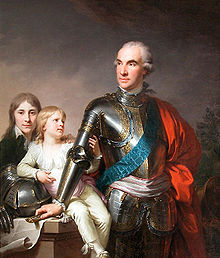- Stanisław Szczęsny Potocki
-
Stanisław Szczęsny Potocki 
Coat of arms Piława consort Gertruda Komorowska
Józefina Amalia Mniszech
Zofia ClavoneNoble family Potocki Father Franciszek Salezy Potocki Mother Anna Elzbieta Potocka Born 1752
KrystynopolDied 14 March 1805
TulczynCount Stanisław Szczęsny Feliks Potocki (Polish pronunciation: [staˈɲiswaf ˈʂt͡ʂɛ̃snɨ pɔˈtɔt͡ski]; 1753–1805), of the Piława coat of arms, was a member of the Polish-Lithuanian szlachta and a military commander of the forces of the Polish-Lithuanian Commonwealth and then Poland. Knight of the Order of the White Eagle, awarded in August 1775.
He was Great Chorąży of the Crown in 1774–1780, voivode of Ruthenian Voivodeship in 1782–1791, Great Lieutenant General of the Crown since 1784, General of Artillery of the Crown in 1789–1792, Marshal of the Targowica Confederation in 1792, starost bełski, hrubieszowski, sokalski, hajsyński, zwinogrodzki. His daughter Olga married Lev Alexandrovitch Narychkine.
Life
He was son of Franciszek Salezy Potocki, Voivod of Kiev, of the Tulczyn line of the family. He entered the public service, and owing to the influence of his relations became grand standard-bearer of the Crown at the age of twenty-two. After the death of Prince August Aleksander Czartoryski in 1782 King Stanisław August appointed him the voivod of Russia. In 1784 he purchased the rank of a colonel from bankrupted Voivod of Kiev Stempkowski and became soon a lieutenant-general.
Elected deputy for Braclaw at the famous Four Years Diet, he began that career of treachery which was to terminate in the ruin of his country. Yet his previous career had awakened many hopes in him. A grand seigneur ruling patriarchally in his vast estates, liberal, enlightened, a generous master and a professed patriot, his popularity culminated in 1784 when he presented an infantry regiment of 400 men as a free gift to the republic. But he identified the public welfare with the welfare of the individual magnates.
His scheme was the division of Poland into an oligarchy of autonomous grandees exercising the supreme power in rotation (in fact a perpetual interregnum), and in 1788 he won over to his views two other great lords, Franciszek Ksawery Branicki and Severin Rzewuski. The election of Małachowski (q.v.) and Kazimierz Lew Sapieha as marshals of the diet still further alienated him from the Liberals; and, after strenuously but vainly opposing every project of reform, he retired to Vienna whence he continued to carry on an active propaganda against the new ideas.
He protested against the constitution of 3 May 1791, and was one of the leaders of the Hetman Party. After attempting fruitlessly to induce the Emperor Leopold to take up arms against the reformers, proceeded with his friends in March 1792 to St. Petersburg, and subsequently with the connivance of the Empress Catherine II formed the Targowica Confederation for the maintenance of the ancient institutions of Poland (14 May 1792), of which he was the marshal, or rather the dictator, directing its operations from his castle at Tulczyn. When the May constitution was overthrown and the Prussians were already in occupation of Great Poland, Potocki (March 1793) went on a diplomatic mission to St. Petersburg; but, finding himself duped and set aside, retired to Vienna until 1797, when he settled down at Tulczyn and devoted himself for the remainder of his life to the improvement of his estates.
Sentenced to death in absentia by the Supreme Criminal Court during the Kościuszko Uprising (1794). On 17 November 1797 he was made a general of the infantry for the Russian Empire and was dismissed on 30 October 1798.
He was buried as a Russian general.
Quote
After the signing of the Targowica Confederation:"Each true Pole, not blinded by the Prussian and royalist cabal, is convinced, that our Fatherland can only be saved by Russia, otherwise our nation will be enslaved".
After Stanisław August Poniatowski's abdication and the destruction of the Polish-Lithuanian Commonwealth: "About past Poland and Poles [I don't want to talk anymore]. Gone is this country, and this name, as many others have perished in the world's history. I am now a Russian forever."
References
Categories:- 1753 births
- 1805 deaths
- People from Chervonohrad
- Generals of the Polish–Lithuanian Commonwealth
- Polish generals in the Imperial Russian Army
- People sentenced to death in absentia
- Diplomats of the Polish–Lithuanian Commonwealth
- Potocki family
- Targowica confederates
- Recipients of the Order of the White Eagle (Poland)
- Recipients of the Order of Saint Stanislaus
- Recipients of the Order of St. Andrew
Wikimedia Foundation. 2010.
